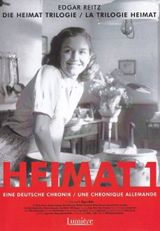
Heimat 1
1984-09-16 | Drama | 11 episodes1 Season
Episode
The Call of Far-Away Places (1919-1928) (1984)
1918 (November) -- World War I ends. 1919 -- the Weimar Republic is set up at Weimar, Germany. Katharina and Mathias Simon live in the small village of Schabbach in the Hunsrick area of Germany. They have three children: Eduard, Pauline and Paul. Eduard has health problems with his lungs and has to be careful with his body. Following the end of World War I, Paul Simon walks at least part of the way home to his little village. He sees his father busy at his blacksmithing duties as usual. Dad doesn't skip a hammer blow when his son shows up suddenly. Paul just joins in the hammering. His mother and sister are more excited about seeing him, but their reaction it is still somewhat subdued from what one might expect on such an occasion. Paul's response is also very subdued. It's as if he were still in the POW camp in France from which he was released. Perhaps he felt as if he was simply going from one prison to another kind of prison. The people of the village start to show up at Paul's house and they are much more excited than any of the Simons, at least outwardly, to see Paul return. Paul starts to fall in love with Apollonia. This again indicates an attitude of distance from the village because Apollonia, who is called a gipsy for her ways and her darker features, has been socially ostracized by the village for her fraternization with a Frenchman. Apollonia even gets pregnant by the Frenchman. She likes Paul saying that he is the only village resident who is nice to her. One day she actually asks Paul to run away with her by staying on the train with her instead of getting off at Schabbach and settle elsewhere. Paul is a bit tempted, but he settles for caution and returns to his home. And then all of a sudden Paul marries the lovely Maria, the daughter of the wealthy town mayor Wiegand and brother to the egotistical and somewhat sadistic Wilfried. They have two sons, Anton and Ernst. Paul becomes a real radio enthusiast and builds his own radio, which takes some doing since the small village does not have most of the components. He then puts on a little picnic concert with some of the villagers, the radio providing the entertainment. The villagers are enchanted to hear the music on the radio and Paul is seen as a kind of local hero for his accomplishment. Just when it seems that Paul is adjusting somewhat to village life, one day he just simply walks away from the village without one word to anyone. (This is just after a bit of symbolism with his setting a trap for a bothersome pine marten. To Paul the village was his trap.) 1923 -- inflation explodes prices upward creating great problems in Germany. Adolf Hitler's Munich Putsch fails and he is imprisoned. In prison he writes his Mein Kampf (My Struggle)

Directed By
- Edgar Reitz
The Center of the World (1928-1933) (1984)
1929 -- the Great Depression begins further impoverishing the less fortunate Germans. This puts great pressure on the ill-equipped Weimar democracy. 1932 -- unemployment is now extremely high. The fascist private army, the SA, with its brownshirts spreads violence in city streets. The Nazi Party makes headway in elections. 1933. Hitler becomes Reich Chancellor. The Reichstag burns and the fascists blame it on the communists. Hitler gets sweeping powers to handle the "threat". This finishes the weak Weimar Republic. A reign of terror begins giving Hitler all the power. Eduard, Paul's younger brother, has developed tuberculosis and he is sent to Berlin for special treatment. He is a little slow emotionally, often appearing way too naive about life. Standing outside a brothel, some of the prostitutes strike up a conversation with Eduard. He seems so sweet and innocent that they invite him into the house. Eduard has no idea where he is, but he enjoys the attention that he receives. The madam Lucie takes an almost immediate liking to him and she has sex with Eduard. Eduard unknowingly misleads Lucie into thinking that he is a member of the landed gentry. Lucie almost immediately marries Eduard. Hitler is starting to become more well-known and powerful in Germany. The villagers get excited about celebrating Hitler's birthday. It seems the only one with any real sense in the village is Katharina Simon, the mother of Paul. She is a down-to-earth, no nonsense woman with a big loving heart for her own children and other people. Katharina is very skeptical of this Hitler character and she decides to get of the village rather than stick around for the Hitler worship. She visits her brother in Bochum. Her nephew Fritz is said to be a communist and he is arrested and sent to a camp where he is to be "reeducated". Katharina takes Fritz's young daughter, blond-headed Lotti, with her back to Schabbach as part of her family. Back home Katharina is further upset with all the Hitler mania. She asks her grandson Anton to tell everyone he has a weak heart and to never put on any kind of fascist-inspired uniform.

The Best Christmas Ever (1935) (1984)
From Berlin the sickly Eduard brings his wife Lucie home to Schabbach. Lucie is an extremely ambitious woman and wants her husband to rise politically. She constantly henpecks poor Eduard to figure out a way to become more and more successful. Eduard's real love, however, is his photography. He is always taking pictures of all kinds of village events and village people. But Lucie pushes him to become a prominent local person in the Nazi Party. Lucie gets Eduard to borrow money from a Jewish banker (despite the hatred of Hitler for the Jews) with which she builds her "dream" house which is the most prominent house in the village. Eduard soon becomes mayor and Lucie revels in her role as the village's first lady, constantly entertaining Nazi party officials so that Eduard will be able to rise even higher in the fascist power hierarchy. Christmas Time, 1935 Lucie is sitting pretty and considers it the best Christmas ever. 1935 -- the Nuremberg Laws strip Jewish people of their basic civil rights. The Jews are becoming legally, socially and politically separated from the non-Jewish Germans. Inter-faith marriage, or even sexual relations, with Jews is strictly forbidden.

The Highway (1938) (1984)
1938 -- to escape the politically worsening situation in Germany, the famous German movie star Marlene Dietrich emigrates to the United States. A young Swedish girl named Zarah Leander with a lovely singing voice (whose grandparents were actually Jewish) becomes Dietrich's replacement. Many of the women in Schabbach simply adore seeing a Zarah Leander romantic musical. Maria, Paul's wife, and Pauline, Paul's sister, return from such a movie and have great fun as Pauline styles her hair in the Zarah Leander fashion. But Maria is still very sad. It has been ten years since Paul left her and her two children: Anton and Ernst. She is the only one of the family who still believes that Paul will return one day. But she is very restless after so many years. So it is no wonder that she responds so well to the family's new boarder, chief engineer Otto Wohlleben who is working on the new highway being built in the area. Otto helps Ernst with the building and flying of model gliders and they develop a close relationship. Otto fractures his right arm in three places and has to have his arm set in a cast. Maria takes care of Otto and the two fall in love.

Up and Away and Back (1938-1939) (1984)
1938 (June) -- German heavy-weight boxer Max Schmeling loses badly in a rematch with American boxer Joe Louis. A bombshell is dropped on Maria and Otto. Paul Simon of Simon Electric Incorporated, Detroit, Michigan, USA, has written to Maria telling her that he is returning to Germany on August 30, 1939, two days before the start of World War II. Paul wrote that he has been worried because of all the bad news about Germany in the press and wants to make sure his family is all right. Maria is devastated and almost panicky. This could not have happened at a worse time, since she now loves Otto and no longer loves Paul. In fact, she is very resentful of Paul who abandoned her and her two children. But as the day of Paul's arrival arrives, Maria becomes so scared of the unknown that she sends Otto away. Naturally, Otto is devastated by having to leave. (Otto, because of some Jewish ancestors, is fired from his job as chief engineer.) On August 30 Maria learns that Paul cannot get off the ship without proof of his Aryan ancestry. To the fascists, the last name of Simon sounds too Jewish. Paul has only three days to get the proof. He talks with Maria on the phone about his problem. Maria has Eduard try to get the necessary papers, but three days is just too little time to get the necessary proof. Paul has to remain on the ship and then has to return to the United States. Maria returns to her village without really seeing Paul. 1939 (September 1) -- Hitler invades Poland starting World War II. 1942 -- the Wannsee Conference fine tunes the Final Solution to eradicate European Jews.

Cast
View Live Cast Profile
Photo












